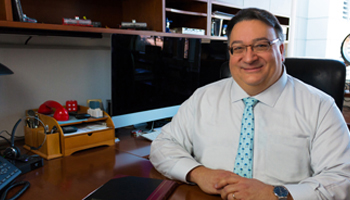HOW CAN WE HELP YOU? Call 1-800-TRY-CHOP
In This Section
CSO Perspectives: In Memory of Carole Marcus, MBBCh, Pioneering Pediatric Sleep Researcher
 Curiosity is one of the driving traits of a stellar researcher, and throughout her career, pioneering sleep researcher Carole Marcus, MBBCh, had an unwavering fascination with sleep medicine. Upon her unexpected recent death, we take a look back over her years of exceptional leadership and clinical research as director of the Sleep Center at Children’s Hospital of Philadelphia and the CHOP Clinical and Translational Research Center/Center for Human Phenomic Science. She also worked closely with colleagues at the University of Pennsylvania as associate director of the Institute for Translational Medicine and Therapeutics, and was an outstanding and generous mentor for many fellows and faculty, having earned the CHOP Faculty Mentor Award in 2015.
Curiosity is one of the driving traits of a stellar researcher, and throughout her career, pioneering sleep researcher Carole Marcus, MBBCh, had an unwavering fascination with sleep medicine. Upon her unexpected recent death, we take a look back over her years of exceptional leadership and clinical research as director of the Sleep Center at Children’s Hospital of Philadelphia and the CHOP Clinical and Translational Research Center/Center for Human Phenomic Science. She also worked closely with colleagues at the University of Pennsylvania as associate director of the Institute for Translational Medicine and Therapeutics, and was an outstanding and generous mentor for many fellows and faculty, having earned the CHOP Faculty Mentor Award in 2015.
In her office at CHOP, Dr. Marcus had a pillow stitched with polysomnography waveforms that she treasured. She found the practice of sleep medicine extremely gratifying because she often saw how diagnosing and treating sleep disorders made a huge difference in patients’ and families’ lives. Dr. Marcus also recognized that interdisciplinary initiatives were needed to fill the research gaps in the field. Throughout her research and clinical practice, she engaged multi-disciplinary teams to address the needs of children with sleep disorders. When she was in medical school in South Africa during the early 1980s, not much was known about obstructive sleep apnea, especially about how it affected children.
Most of Dr. Marcus’ research focused on the physiology of pediatric obstructive sleep apnea syndrome (OSAS) — specifically the relative roles of anatomy and neuromotor control of the upper airway from infancy to adolescence — to better understand the factors leading to airway collapse in sleep. During sleep, a child with OSAS stops breathing usually because there is a blockage from enlarged tonsils or adenoids, causing a brief arousal that increases muscle tone, opens the airway, and allows the child to resume breathing. Recurrent nightly episodes of sleep disruptions caused by OSAS have been associated with adverse behavioral, cognitive, quality of life, and health outcomes in children.
Dr. Marcus was the first author of a large, randomized multicenter study published in the New England Journal of Medicine in 2013 called the Childhood Adenotonsillectomy Study for Children With OSAS (CHAT). Results of the study showed that study participants who underwent surgery to remove their adenoids and tonsils had notable improvements in behavior, quality of life, and other symptoms compared to those treated with “watchful waiting” and supportive care, but the researchers did not find any improvements in cognition.
One of the lessons that Dr. Marcus learned from being a co-investigator of the CHAT Study was that “one treatment does not fit all” and more therapeutic choices for pediatric OSA are needed. While adenotonsillectomy is relatively safe, about 3 percent of children will have significant hemorrhage postoperatively, and other complications can occur.
An ongoing study, called Steroids for Pediatric Research in Kids (SPARK) that Dr. Marcus was leading as the principal investigator, aims to look at the effects of nasal steroids on treating OSA as an alternative to surgery. Dr. Marcus chaired the American Academy of Pediatrics clinical practice guidelines for the diagnosis and management of OSAS issued in 2012. These guidelines included nasal steroids as a treatment option, but there was not enough evidence to give a strong recommendation. Dr. Marcus and colleagues launched the SPARK study to increase knowledge about the effect of nasal steroids and to identify which subgroups of patients with OSAS are most likely to benefit.
Dr. Marcus held virtually every leadership position in pediatric sleep medicine at some point during her abbreviated career and received numerous awards, including the William C. Dement Academic Achievement Award in Sleep Medicine. In an interview about that prestigious award, Dr. Marcus told Bench to Bedside: “Sleep remains one of the big enigmas in medicine. So little research has been done in pediatric sleep, and there is so much to find out.”
All of us at CHOP Research Institute will dearly miss Dr. Marcus, who has been part of CHOP’s family since 2003, but we will ensure that her commitment to exploring the world of pediatric sleep medicine endures. A memorial service for Dr. Marcus will be held at CHOP in January.